Recruit Group aims to reduce the time it takes to get hired by half by FY2030*1. In FY2021, which was our first fiscal year to tackle this goal, we focused on defining the time it takes for job seekers to get hired, or our FY2021 baseline duration, based on the data reported by Indeed users. Our data showed that it takes approximately 15 weeks*2. In addition, our global job seeker survey revealed that about half of the job seekers were looking for a job longer than they could maintain their standard of living*3. These findings reaffirm why it is important for us to quickly identify and provide support to those job seekers most in need of assistance.
*1 The period from the time a user starts an active job search on the Indeed job platform to the time the user confirms receipt of a job offer.
*2 Baseline job search duration calculated as of March 31, 2022. Calculated as the period from the time users started an active job search on the Indeed job platform to the time that 90% of such users had received a job offer (assuming for this purpose that the period it takes for 90% of users to receive a job offer represents a statistically significant value). The job search duration is calculated based on surveyed user data collected between September 2021 and March 2022.
*3 A global labor force survey conducted by Indeed between September to December 2021. The survey targeted respondents in 30 countries where Indeed has a business footprint and in 17 languages.
Job Search Duration Found to Be 15 Weeks
In FY2021, we conducted a proprietary global labor force survey to better understand the difficulties job seekers face and identify those who need the most support. Simultaneously, we calculated the data from Indeed users to define our FY2021 baseline duration for our commitment to halve the time it currently takes to get hired by FY2030, and found it to be approximately 15 weeks.
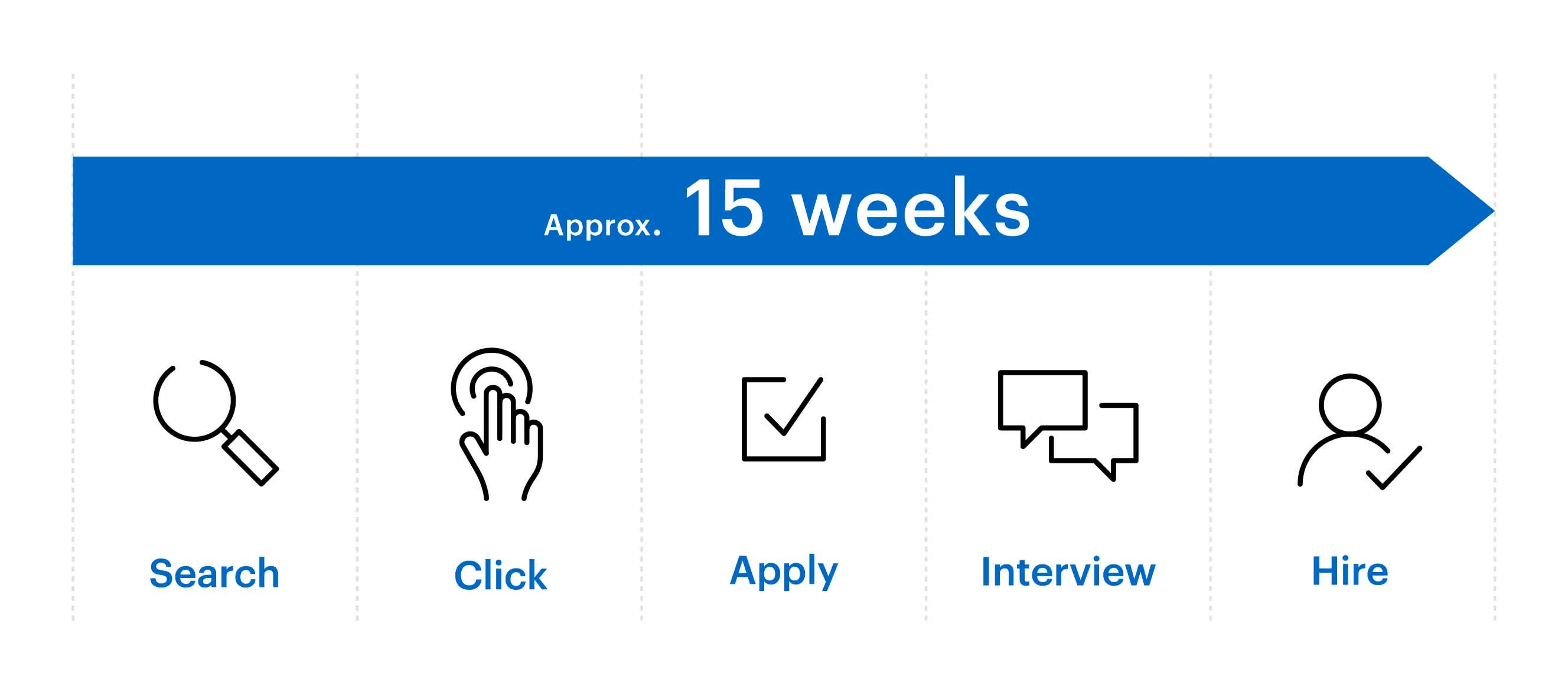
When Does a Job Search Begin, and When Does It End?
With no established measurement methods available to capture exactly how long it takes for job seekers to get jobs on a jobs platform, our journey started from developing a methodology to enable us to answer this question. Based on years of accumulated data on Indeed, today we can identify the hiring signal, which shows when a job seeker receives a job offer. However, it is much more complex to identify the starting point of a job search based on historic data alone. Usage patterns of job seekers on jobs platforms are extremely diverse. Some may spend months casually visiting and searching for jobs, while others may intend to find a job that day. In order for us to be able to shorten job search duration, we must be able to capture the entire journey, not just from the point when an application is submitted or interviewing starts. To take on this challenge, we formed a cross-functional team, including data scientists and researchers, to work together to pinpoint the starting point of a job search.
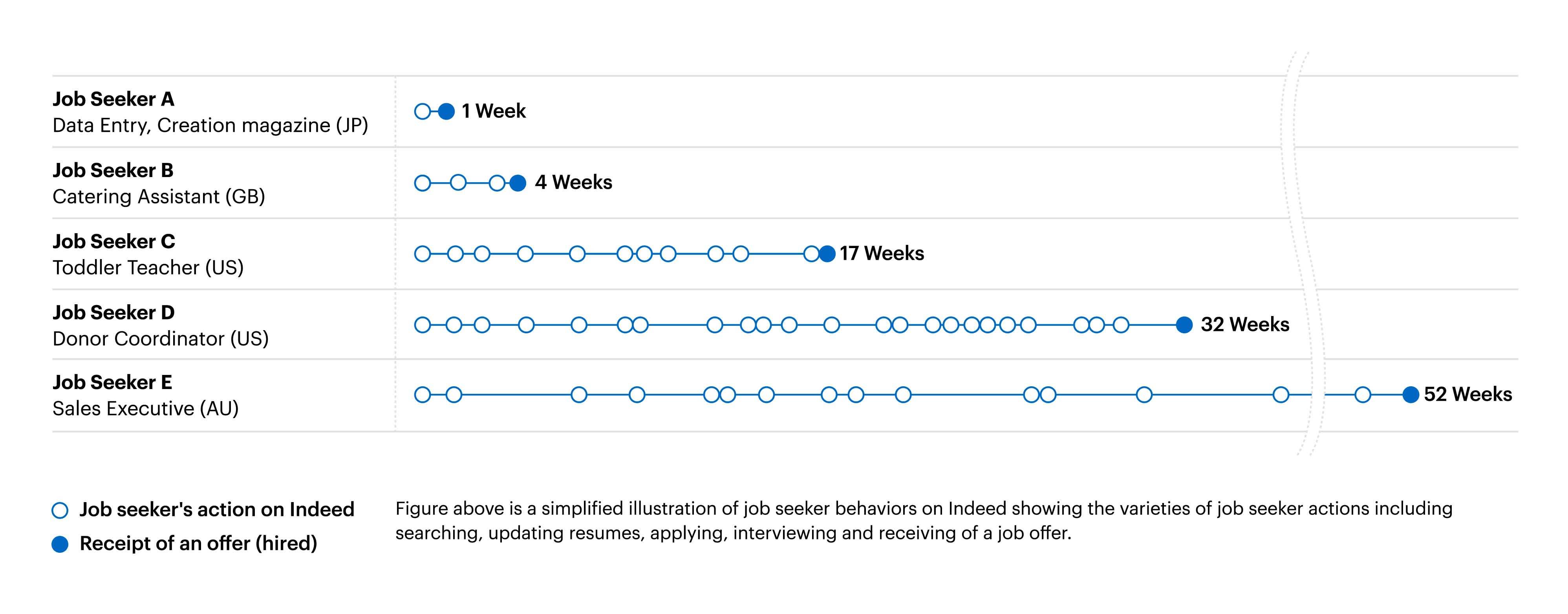
FY2021 Baseline Duration: Approximately 15 Weeks
Firstly, we captured the actual data for how long it currently takes for Indeed users to get hired on Indeed. The analysis of users' feedback indicated that — for those who got hired on Indeed — the median time was about three weeks, with an average of about seven weeks. However, it took approximately 15 weeks until most of them got jobs. We took the 90th percentile data point as a statistically significant value, representing the most job seekers hired on Indeed. We set this 15 weeks period as the baseline duration of FY2021 to be cut in half by FY2030, to ensure that we capture users who may be struggling and require assistance.
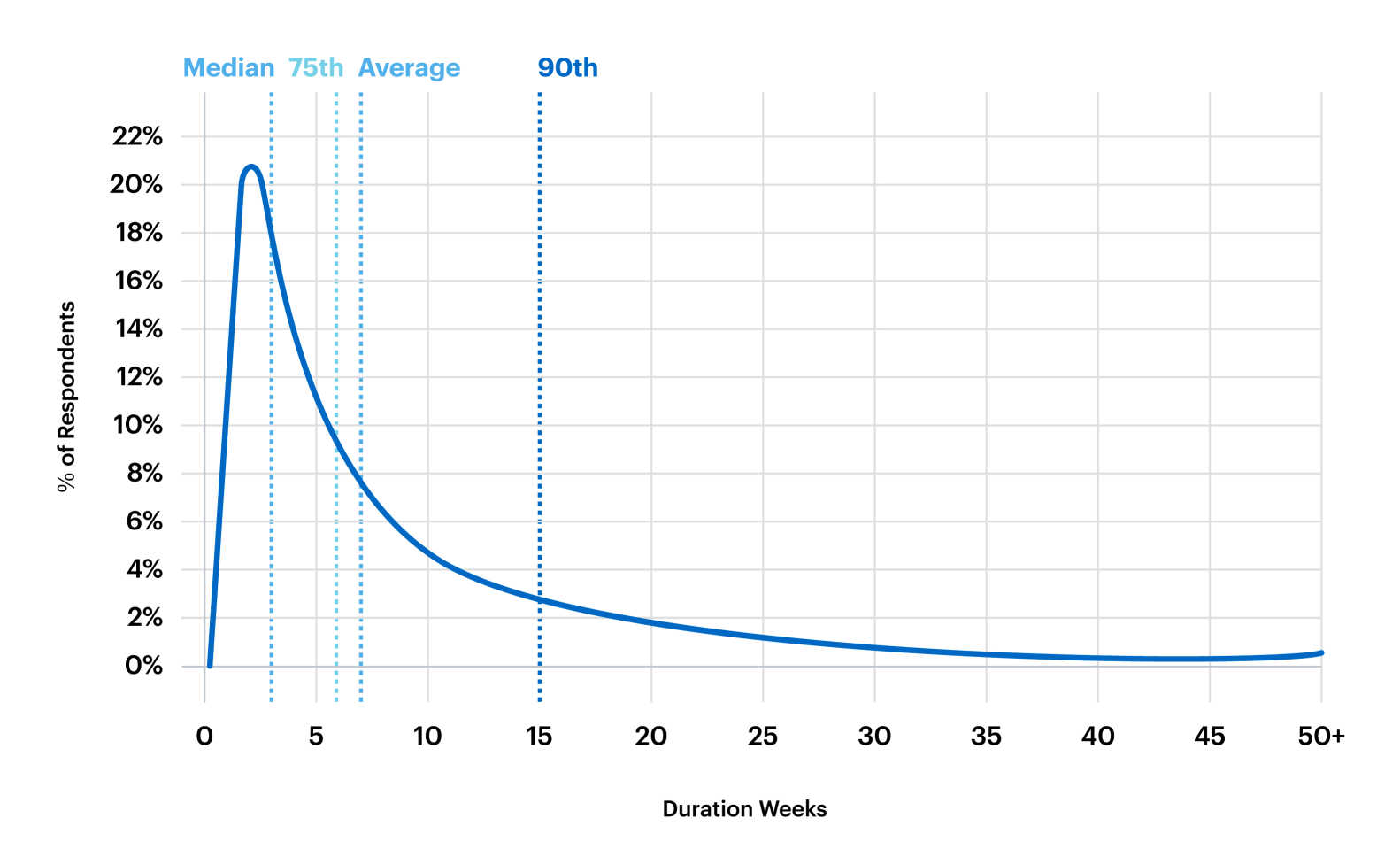
15 weeks until 90% got jobs on Indeed
50% Said the Job Search Duration Was Longer Than They Could Cover Their Living Expenses Without Income
To gain a broader insight into the time it takes to get jobs and the needs of job seekers, we conducted a proprietary global labor force survey in 17 languages across 30 of the countries and regions in which we operate. Nearly 50% of survey respondents reported that their job search duration was longer than the amount of time they could cover their personal expenses if they had no income. Regarding how they felt about their job search duration, about two-thirds of respondents said that their job search took longer than they wanted, and nearly half of them said it was considerably longer. The results suggest that it is important for us to be able to quickly identify and provide support to those job seekers most in need of assistance.

Approx. 50% experienced a job search duration longer than their personal financial runway
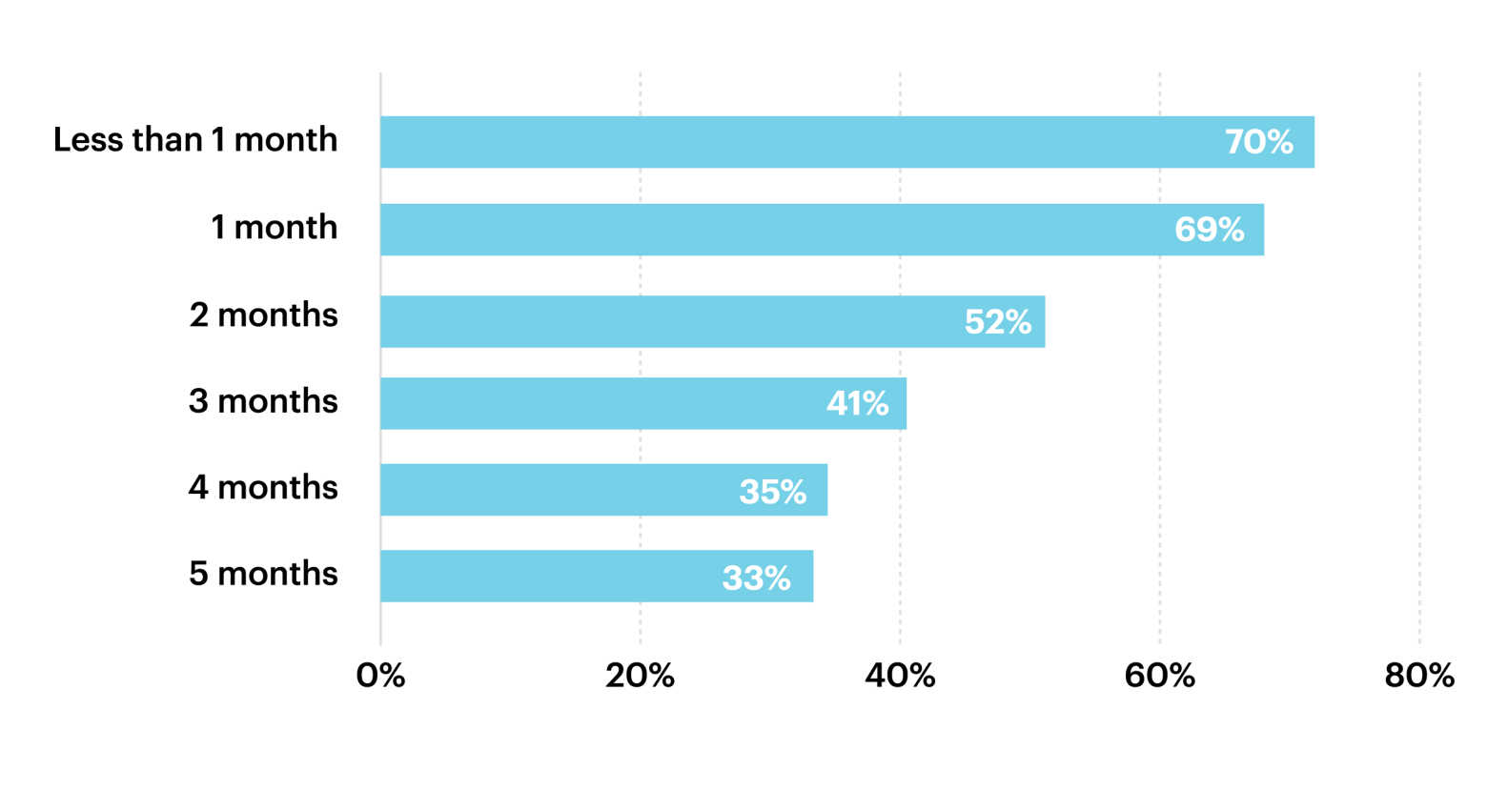
By the number of months able to cover expenses without income: % of respondents who had a duration longer than the time they could cover expenses without income
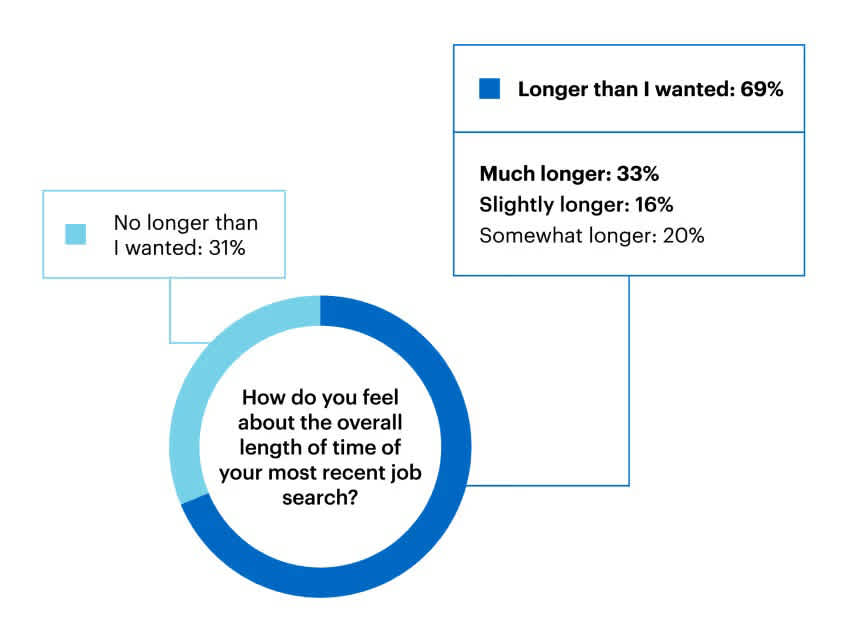
About 2 out of 3 said that their job search took "longer than they wanted"
Our Challenges in FY2022
As we enter the second year of our journey, in FY2022, we plan to conduct deeper research as well as analysis of users' data to better understand the pain points of job seekers and factors that are making job searches longer, and identify job seekers who need more help than others, for example, those who are more urgently seeking a job. In parallel, we will continue gathering more data to increase the accuracy of our measurement of job search duration. We will also work to implement some solutions that improve the job search and hiring experience through product advancement to help people get jobs faster and easier.
It is our mid- to long-term aspiration that the Indeed platform becomes increasingly automated, using advanced technologies to further improve the experience for job seekers. We consider that we are just at the starting line of the process of realizing this vision, and will continue to take steps toward our goal for the benefit of job seekers worldwide.